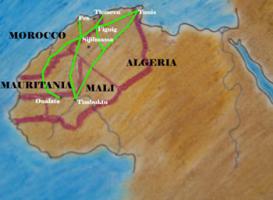Morocco received approval for a $25 million loan from the Climate Investment Funds’ Clean Technology Fund (CIF CTF) for a project to generate solar power through an innovative hybrid Concentrated Solar Power (CSP) and Photovoltaic (PV) solution.
The Midelt Phase I Concentrated Solar Power Project is being supported by the African Development Bank (AfDB) and the World Bank with an additional allocation of US$ 25 million in CTF resources.
The project consists of two separate CSP plants, each with 150-190 MW CSP capacity and a minimum of 5 hours of thermal storage. The envisaged installed capacity of the PV component could reach approximately 150-210 MW, making the total capacity of each of the proposed plants 300-400 MW and the total capacity of this first phase 600-800 MW.
The project’s innovative hybrid solar design is also built on a unique Public-Private Partnership between the Moroccan Agency for Sustainable Energy (MASEN) and private sector sponsors – with a Build, Own, Operate and Transfer project structure and implementation approach.
Selected sponsors are expected to form a Special Purpose Company to build and operate the plants and sell the generated electricity to MASEN under a 25-year Power Purchase Agreements (PPAs). The process will be designed to allow the award of the plants to different bidders. The support from the CTF and AfDB is critical in driving down the cost of the project’s capital and lowering the Levelized Cost of Electricity.
“In 2015, the world saw an important shift in CSP investment from the developed to the developing world, particularly in Morocco” stated Anthony Nyong, AfDB’s Director, Climate Change and Green Growth.
“Morocco’s path-changing Noor CSP program under CTF, for which we serve as implementing agency, has been a critical element of that shift. This new project, which will be modelled on the Noor operational and financial structure, will increase the development of solar energy and further help diversify the country’s energy mix and enhance its energy security. We believe that the project can serve as a model for other countries in the region and beyond,” he added.
The project will significantly contribute to the Government of Morocco’s achievement of its Nationally Determined Contribution under the Paris Agreement, including its goal of achieving 52% of installed capacity from renewable energy (20% from solar) by 2030. Morocco’s Solar Plan will also contribute to industrial development, competitiveness and could create about 30,000 jobs.
“Until now, CSP has been the dominant renewable energy technology assuring electricity during peak hours and by adding a PV component, we expect enhancing the reliability of the power plant” stated Leandro Azevedo, AfDB’s CIF Program Coordinator and Senior Climate Finance Officer. “The combination of these two technologies will allow Morocco to optimize the dispatch of generated power during the daytime by ensuring that the utilization of the CSP component can be maximized during night-time through the use of thermal storage,” he said.
Estimated greenhouse gas savings for the Noor-Midelt Phase 1 project is about 1.2 million tCO2 equivalent per year and 36 million tCO2 equivalent over the project’s 25 year-lifetime.
Established in 2008, as one of the largest fast-tracked climate financing instruments in the world, the US $8.3-billion CIF provides developing countries with grants, concessional loans, risk mitigation instruments, and equity that leverage significant financing from the private sector, Multilateral Development Banks (MDBs) and other sources.
Five MDBs – the African Development Bank (AfDB), Asian Development Bank (ADB), European Bank for Reconstruction and Development (EBRD), Inter-American Development Bank (IDB), and World Bank Group (WBG) – implement CIF-funded projects and programs.
